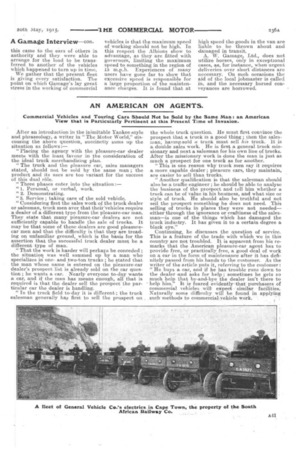AN AMERICAN ON AGENTS.
Page 13

If you've noticed an error in this article please click here to report it so we can fix it.
Commercial Vehicles and Touring Cars Should Not be Sold by the Same Man; an American View that is Particularly Pertinent at this Present Time of Invasion.
After an introduction in the inimitable Yankee style and phraseology, a writer in "The Motor World," discussing the above question, succinctly sums up the situation as follows :— "Placing the agency with the pleasure-ear dealer meets with the /east 'favour in the consideration of the ideal truck merchandising plan.
" The truck and the pleasure car, sales managers stated, should not be sold by the same man ; the product and its uses are too variant for the success of this dual role.
" Three phases enter into the situation:— " 1. Personal, or verbal, work.
"2. Demonstrating.
"3. Service ; taking care of the sold vehicle.
"Considering firit the sales work of the truck dealer or salesman, truck men aver that their-vehicles require a dealer of a different type from the pleasure-ear man. They state that many pleasure-car dealers are not sufficiently capable to handle the sale of trucks. It may be that some of these dealers are good pleasurecar men and that the difficulty is that they are treading on unfamiliar ground, which is the basis for the assertion that the successful truck dealer must be a different type of man.
"That the work is harder will perhaps be conceded ; the situation was well summed up by a man who specializes in oneand two-ton trucks ; he stated that the man whose name is entered on the pleasure-car dealer's prospect list is already sold on the car question; he wants a car. Nearly everyone to-day wants a car, and if the man has means enough, all that is required is that the dealer sell the prospect the particular car the dealer is handling.
" In the truck field to-day it is different ; the truck salesman generally has first to sell the prospect on
the whole truck question. He must first convince the prospect that a truck is a good thing • then the salesman, having; sold a truck must sell Ls truck. It is a double sales work, He is first a general truck missionary and next a salesman for his own line of trucks. After the missionary work is done the man is just as much a prospect for one truck as for another.
"This is one reason Why truck men say it requires a more capable dealer ; pleasure cars, they maintain, are easier to sell than tracks.
Another qualification is that the salesman should also be a traffic engineer ; he should be able to analyse the business of the prospect and tell him whether a truck.can be of value in his business, and what size or style of truck. He should also be truthful and not sell the prospect something he does not need. This selling of trucks in places they were not needed— either through the ignorance or craftiness of the salesman—is one of the things which has damaged the truck industry. It has given it to a certain degree a black eye."
Continuing, he discusses the question of service. This is a feature of the trade with which we in this country are not troubled. It is apparent from his remarks that the American pleasure-car agent has to provide free, or practically free, a good deal Of work on a car in the form of maintenance after it has definitely passed from his hands to the customer. As the writer of the article puts it, referring to the customer : " He buys a car, and if he has trouble runs down to the dealer and asks for help ; sometimes he gets so much help that by-and-bye the dealer isn't there to help him." It is feared evidently-that purchasers of commercial vehicles will expect similar facilities. Naturally some difficulty will be found in applying • suchmethods to commercial-yehicle work.






















